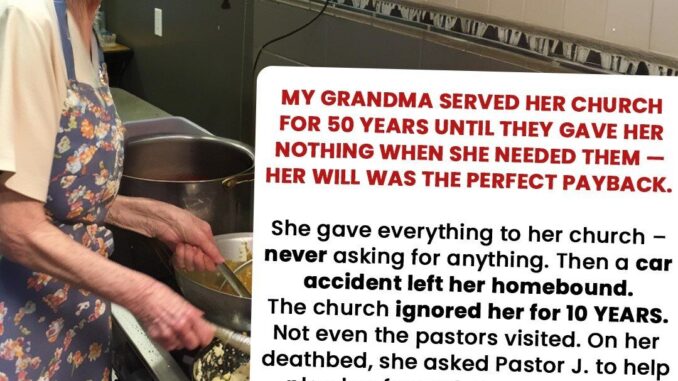
The sun bathed the day of my grandmother’s funeral in a soft, warm light, as though reflecting the kindness that radiated from her heart. Her name was Eleanor—a woman who had devoted nearly fifty years to her Southern Baptist church. She had cooked casseroles, taught youth Bible study, driven the van on retreats, and quietly funded scholarships for children in need. She arrived early, stayed late, and never sought recognition—until the moment she needed it the most.
At seventy-three, a car accident left her disabled. The lively gardener who once greeted the dawn now needed a cane to climb her porch steps, her bones aching with each movement. She reached out for rides, visits, prayers—anything to stay connected—but the halls of the church were empty, and its leaders silent.
Every Sunday, I dressed in my best church clothes and brought her slices of lemon cake, pretending that Pastor J. had asked about her or that Pastor M. missed her famous potato salad. For a while, her hopeful smile made my small lies feel like acts of kindness. But one afternoon, as she stirred sugar into her tea with quiet resignation, I finally told her the truth: they didn’t ask, they didn’t care. Her shoulders slumped, but her eyes held a steady strength.
When she was in hospice, she asked for Pastor J. “Just once more,” she whispered, naming the hymn she wanted sung, the verse she loved. He never came. Instead, Pastor M. appeared, polished and brisk, spending his time asking if she would remember the church in her will. He spoke of roofs and scholarships, as though her life’s work had been collateral, not the deep, unwavering love she had given to every pew and potluck.
My grandfather’s silence was his anger; his fists clenched, his heart breaking alongside hers. When Pastor M. left with his clipboard and his smug smile, my grandmother—who had never asked for much—finally wept. “He didn’t ask about my soul,” she said. “Only my money.”
In the months leading up to her death, Eleanor planned her final act with the same quiet determination she had brought to every service and gathering. At her funeral, held in a modest chapel instead of the grand sanctuary she had devoted so much of her life to, the room was filled with people who truly loved her, not those who had taken her for granted. My grandfather stood at the front, her well-worn Bible pressed to his chest, and spoke the truth she could no longer voice: the church that had abandoned her would not lead her home.
At the reading of her will, the pastors arrived, dressed for a windfall. Instead, they learned that each would receive precisely one cent. The rest of her estate, once meant for stone and steeple, was given to Reverend Lila Hayes—the woman who had sat by her side, brought her meals, prayed with her, and treated her as the living treasure she was.
Thus, Eleanor’s legacy endured, not in empty words or photos with dignitaries, but in the lives of those who truly saw her, loved her, and understood that faith is not measured by position, but by presence.
Leave a Reply